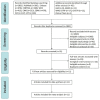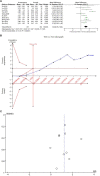Acupuncture for mild cognitive impairment: A systematic review with meta-analysis and trial sequential analysis
- PMID: 36686535
- PMCID: PMC9853885
- DOI: 10.3389/fneur.2022.1091125
Acupuncture for mild cognitive impairment: A systematic review with meta-analysis and trial sequential analysis
Abstract
Background: There is insufficient evidence to support the use of acupuncture for mild cognitive impairment (MCI), and there is no consensus on its efficacy. This review aimed to determine the acupuncture effect in patients with MCI.
Methods: Relevant and potentially eligible randomized controlled trials (RCTs) of acupuncture for MCI were obtained from four Chinese databases, four English databases, and additional resources up to 1 August 2022. The primary outcome was the improvement in overall cognitive function (OCF). Secondary outcomes were improved memory function (MF) and activities of daily living (ADLs). The revised Cochrane collaboration risk of bias (ROB) assessment tool (ROB 2.0) was applied to evaluate their methodological quality. The Review Manager software v 5.4 was used for analyses. Trial sequential analysis (TSA) 0.9.5.10 β software was used to estimate the required sample size and test the reliability of the pooled outcome. The quality of evidence was assessed using the Grading of Recommendations Assessment, Development, and Evaluation (GRADE) tool.
Results: This meta-analysis included 11 RCTs with a total of 602 patients. The methodological quality of all trials was moderate. Low-quality evidence showed that acupuncture significantly improved OCF (Mini-Mental State Examination (MMSE): mean difference (MD) = 1.22, 95% confidence interval (CI): 0.78-1.66; the Montreal Cognitive Assessment Scale (MoCA): MD = 1.22, 95% CI: 0.47-1.97). In subgroup analyses, it was revealed that acupuncture significantly increased OCF in patients with MCI when compared to conventional medicine (CM) and sham acupuncture (SA). TSA's findings indicated that the evidence of improving OCF with acupuncture for patients with MCI was conclusive. Meanwhile, there is no statistical difference in the improvement of MF and ADL between acupuncture and CM. TSA showed that the evidence of improving MF and ADL for patients who had MCI and received acupuncture was inconclusive. The shreds of evidence of improving MF and ADL were ranked from low to critically low.
Conclusion: Acupuncture appears to be an effective clinical application method for improving OCF in patients with MCI. However, due to low-quality evidence, more relevant and high-quality research is needed in this field.
Systematic review registration: https://www.crd.york.ac.uk/prospero/display_record.php?ID=CRD42021291284, PROSPERO, No. CRD42021291284.
Keywords: acupuncture; meta-analysis; mild cognitive impairment; systematic review; trial sequential analysis (TSA).
Copyright © 2023 Yin, Li, Jiang, Xia, Chen, Zhang, Zhao and Liang.
Conflict of interest statement
The authors declare that the research was conducted in the absence of any commercial or financial relationships that could be construed as a potential conflict of interest.
Figures






References
-
- World Health Organization . Global Status Report on the Public Health Response to Dementia: Executive Summary. Geneva: World Health Organization; (2021).
Publication types
LinkOut - more resources
Full Text Sources
Medical
Research Materials

